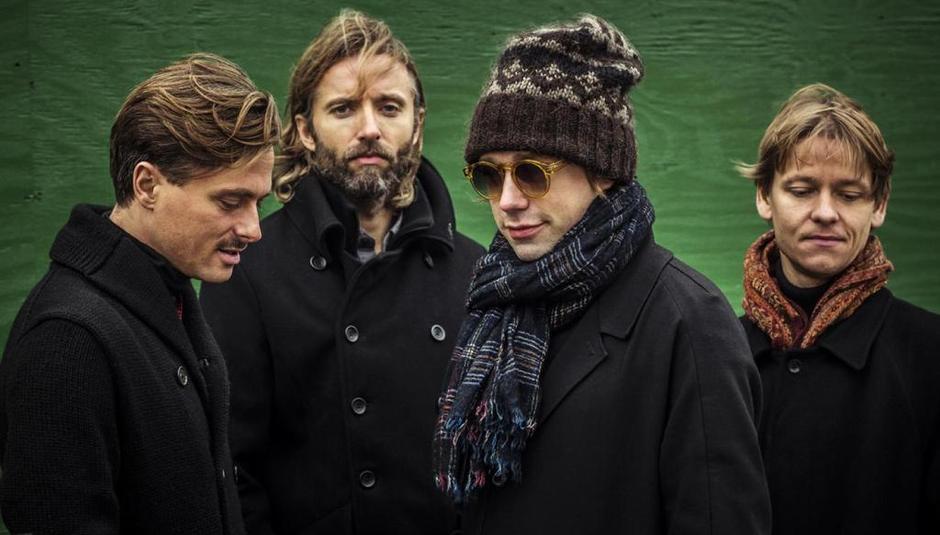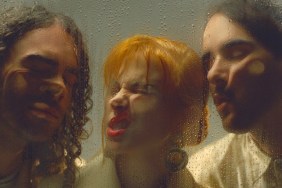It may be their 21st year as a band, but for many listeners Danish dream-pop devotees Mew remain as elusive as the eponymous Pokemon. They have remained on the fringe for the majority of their careers, despite a tangible and considerable global following and even a string of successful singles in their native land.
Then again, that’s where they belong – theirs is a brand of indie-rock that is at once cavernous and deep as well as immediate and close-range. It recalls a myriad of styles and sounds, and yet when brought together it’s unlike basically anything else. They may not hold the key to super-stardom, but they remain superstars to all who have discovered them over the years. Mew are, for lack of a better term, the greatest band you have never heard.
Over a half-decade has passed since the band’s extensively-titled 2009 LP No More Stories Are Told Today, I’m Sorry, They Washed Away, No More Stories, The World is Grey, I’m Tired, Let’s Wash Away . In that time, the band have reunited with bassist Johan Wohlert after a seven-year absence; as well as having returned to the live stage, having played several festivals and key headlining shows to properly fine-tune their imminent return.
We now have ‘+ -‘, pronounced “plus minus”, which is the band’s sixth album overall. It serves as both a perfect introduction to those that have not been paying attention previously as well as another thrilling installment into what many consider a generally-spotless discography.
Ahead of the album’s local release, lead singer and keyboardist Jonas Bjerre discussed painting trees in the forest, the band’s legacy and working with the voice behind “the Gotye song.”
Watch: Mew – Satellites
Music Feeds: Even by Mew’s standards, six years is a remarkably long time between albums. It’s probably the central focus of what people are discussing regarding the context of ‘+ -‘, it must be a relief to finally have it out in the world.
Jonas Bjerre: Yeah, it’s very gratifying to be releasing this into the world. I’m really excited. It’s been a long time. Even we were shocked at how long it’s taken. We were hoping to have this out in 2012. There’s been a lot of getting caught up in the details, but I feel like it’s paid off.
MF: Considering it’s a record you’ve been working on for so long, can you remember back to what the first song was that kicked off the process of creating it?
JB: We took a little time off after the last record, and then we all got back together to start putting together some ideas. Johan wasn’t back in the band at this point; so it was just me, Bo [Madsen, guitar] and Silas [Utke Graae Jørgensen, drums] at this house in Sicily.
A few of the things we were working on while we were there definitely made it onto the album, I’m trying to think what they are now… [pauses] It was mostly about finding out what we wanted to do with the album. That’s where the song Interview the Girls started. There was a little bit of what ended up being Witness in there, too. It’s kind of hazy for me, though. It feels like so long ago.
MF: Where did the writing of ‘+ -‘ take you? Are you the kind of band that conscientiously attempts to move away from what you’ve done previously? Is the writing more organic in nature or predetermined?
JB: A little bit of both. I think we always strive to not repeat ourselves too much. There actually was a point where we started sounding like a proper band again. I really love our last record, but it’s much more like a cloud of ideas and it sounds less like a band playing together than this one does for me.
The method of writing was still the same, and I started getting stuck behind the keyboard a lot. It started to sound like No More Stories, and that’s not what we wanted. We intentionally avoided that. At the same time, we still wanted to let the songs be what they wanted to be. There’s a lot of diversity on this record. We’ve got a lot of long songs, we’ve got short songs, all the songs are very different from one another. There’s a lot of elements in there.
Listen: Mew – Witness
MF: Johan was out of the band for about seven years, returning in 2013. What brought him back in? Were you able to settle those “creative differences” that make so many musicians quit their bands?
JB: [laughs] I don’t think it was so much that. I think that he was at a point where he was going to have his first child and he wanted to be at home with his family. He was telling us all of this as we were making a video for The Zookeeper’s Boy. He wasn’t mentally prepared to go on a long U.S. trip that we were about to go on.
We were touring a lot, and he felt he couldn’t abandon his family like that. We remained friends, though – it was really hard to make No More Stories without him. We grew up together, we did everything musically together.
It was never a matter of not wanting him back, or him saying he’d never come back. It was just one of those things that happened. It was when we were initially working on this album that Michael [Beinhorn, producer] said to us that he missed the element of Johan in the band. That was a big part of the last record he worked on with us, which was And the Glass Handed Kites. I think that was the motivation that we needed to call him up and ask him if he wanted to play with us again. After a few days, it was like he had never left.
MF: Russell Lissack from Bloc Party plays guitar on the album. From all reports, this is a collaboration you’ve been wanting to happen for quite some time.
JB: We toured with Bloc Party in the States some years ago. We really hit it off with Russell in particular, he shares a lot of the same interests with us and we all really admire his guitar playing. It’s very precise and it’s very unique.
Bo wanted to play up against him in a call-and-answer style, but we’d never really included people in writing sessions before. This was kind of a new thing for us. Russell came over for about three days, and we got a lot done. It was really efficient. When someone new comes into what you do, they bring a lot of sunshine. That was very much the case with Russell. The song [My Complications] turned out beautifully.
Watch: Mew – The Zookeeper’s Boy
MF: Kimbra was another surprise guest on the album – can you tell us about working with her?
JB: That actually started because she was working on her album with Rich Costey, who we’ve worked with a lot. She used to listen to a lot of Mew when she was younger, and so she asked through him if we’d be interested in having her sing on one of our songs.
I wasn’t all too familiar with her. I obviously knew the Gotye song, which I loved; but I didn’t know her solo songs that well at that point. I was so impressed when Rich sent me over her songs – they’re so full of imagination, so inventive. It’s basically progressive pop, which is my favourite style of music if that even exists.
I knew she’d be perfect for the album and she actually ended up singing quite a bit on the album. I think she ended up on about four songs away from the one she sings lead on [The Night Believer]. She sent me all these vocal tracks, and she builds and layers her vocals so brilliantly.
MF: Did it make you feel a little old hearing someone say they grew up listening to you?
JB: Absolutely! [laughs] I meet journalists who tell me they heard us when they were twelve years old when a particular record came out; and you just can’t believe it. “You were twelve?!?” Apart from little things like that, though, I try not to think about it all that much. I just keep doing my thing.
MF: Last year marked 20 years since the band actually started. Apart from Johan’s hiatus, the line-up has remained exactly the same. Did you ever think that Mew would last as long as it has?
JB: I feel incredibly proud of what we’ve done; and I also feel extremely grateful to be able to continue doing this. I think that’s the key to happiness, to be grateful for what you have. We have a lot in this band. It’s an amazing thing to travel the world and have people responding to your music, understanding what you’re trying to do. It’s extremely gratifying. It’s unlike anything in the world.
There’s just one thing – not so much a regret, but just an observation. I wish we were more prolific. I mean, this is our sixth album in twenty years! When you look at it, that’s not that many albums at all. There are very long breaks in-between.
I think we could work faster in the future if we put our mind to it. Sometimes, it’s like you’re painting a tree and you’re doing it with such detail that you forget that you’re supposed to be painting an entire forest.
Watch: Mew – Water Slides
MF: A lot of notable people have sung your praises – Coldplay, J Mascis, even Bono. Who, to you, has been the most unexpected Mew fan?
JB: I would have to say Trent Reznor. He asked if we wanted to go on a Nine Inch Nails tour, and of course we did. We ended up doing a very long tour of Europe and the States with them, and it was a great experience.
It was very strange to me, though. I suppose that Mew does have that darker element within our music, but it’s obviously not quite as dark and aggressive as Nine Inch Nails. I was worried about how their fans would react, but they were really cool. They were so open to us. I think we got a lot of new fans on that tour. That was a massive surprise to me.
MF: There’s a fan group here known as Mewstralia, who’ve followed you guys for years now in the hope that one day you’ll finally make it down here. Earlier this year, they hinted that we’ll be seeing Mew in Australia on the tour cycle for ‘+ -‘. Do you have any more information regarding that yet?
JB: I don’t have any precise information yet. I know that everyone is working hard to make it possible. It’s all about logistics. We’ve been so close, we’ve been to South-East Asia, to Indonesia. It’s so frustating that we’ve never been, we have to go. It’s crazy we haven’t gone yet. We’ve got people waiting for us.
–
‘+ -‘ is released digitally this Friday, April 24th.











